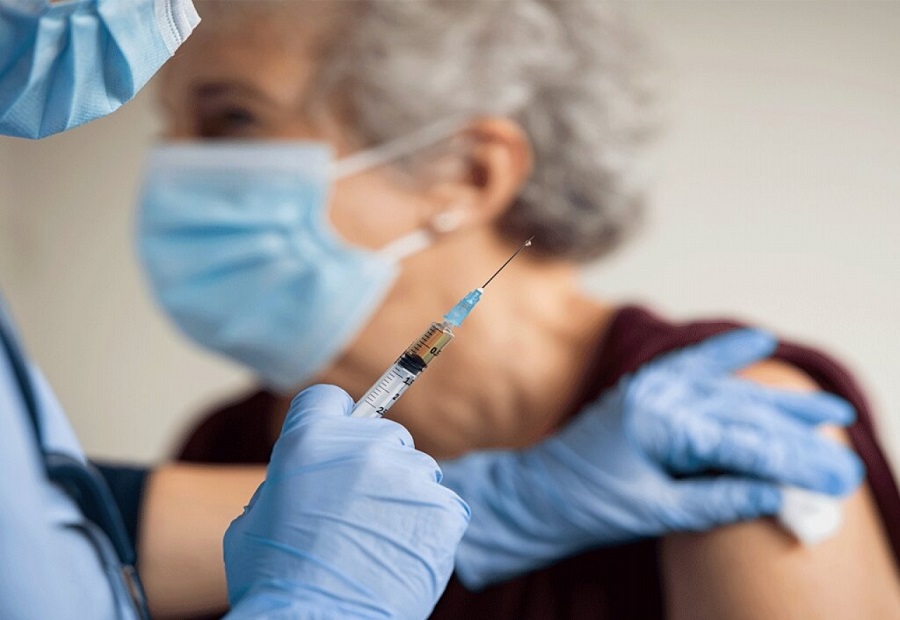RIO DE JANEIRO, BRAZIL – Two outbreaks of the alpha variant of the novel coronavirus show that vaccinated individuals may still transmit the virus and develop Covid-19, but that vaccination prevents severe cases.
The infected, with an average age over 70, were administered one dose of the AstraZeneca vaccine or two doses of the Coronavac. Only one death was registered, of an 84 year-old with Alzheimer’s disease.

The study supported by FAPESP (São Paulo State Research Foundation) was published on the Preprints with The Lancet platform, still to be peer-reviewed.
“The results show that people who have been vaccinated can be infected with the alpha variant and, irrespective of whether they have the disease or not, they can pass the virus on to those who have not yet been vaccinated. This is concerning because it can create a selection bottleneck for strains that can return to cause the disease even in vaccinated people. And it shows the importance of maintaining social distancing measures and the use of masks,” says José Luiz Proença Módena, professor at the State University of Campinas’ Biology Institute (IB-Unicamp), who led the study.
In a former study, the group had shown that serum from the blood of patients vaccinated with the Coronavac created fewer antibodies to the gamma variant (P.1) than to the original virus strain, therefore indicating that vaccinated individuals could potentially become infected.
A study published in April by Oxford University researchers shows that the alpha variant can infect even people immunized with Pfizer and AstraZeneca’s vaccines.
“Our work is one of the first reports of the transmission dynamics of a SARS-CoV-2 variant of concern in vaccinated people. And at the same time with a very low rate of worsening of the disease, much lower than we would expect from a population with such a high average age. Therefore, it demonstrates a protective effect of vaccination for the development of Covid-19,” Módena explains.
However, the study highlights the sustained transmission dynamics of the virus. The outbreaks were contained due to a quick diagnosis and the immediate isolation of infected patients by the Campinas Municipal Health Surveillance Department. As a result, a little more than half of the populations studied were infected.
The researchers measured the viral load in infected vaccinees at both sites, but there were no significant differences between the two vaccines. In addition, they assessed the amount of neutralizing antibodies to the alpha variant in patients who tested positive.
“We found no correlation of the disease picture with the titer [amount] of neutralizing antibodies. People who had symptoms had more antibodies than those who were asymptomatic, probably a response to the infection and not to the vaccines. This means that protection does not necessarily depend only on antibodies, but on other components of the immune response induced by vaccination,” the researcher explains.
Mild and asymptomatic cases
The alpha variant, previously called B.1.1.7, was first detected in the UK in September 2020 and was responsible for the second wave of the pandemic in that and other European countries. It was first reported in Brazil in December 2020 and its presence has been confirmed in over 10 states.
In the current study, genomes of the novel coronavirus were sequenced from residents and workers of two nursing homes in Campinas. The sequencing was supported by the Brazil-UK Center for Discovery, Diagnosis, Genomics and Epidemiology of Arboviruses (CADDE), supported by FAPESP.
In one of the outbreaks, at a convent for retired nuns, 15 of the 18 residents and 7 of the 8 staff were vaccinated with one dose of the ChAdOx1 vaccine, developed by AstraZeneca pharmaceutical company in partnership with the University of Oxford. The average age was 73. There were 16 reported cases, half of them classified as mild and half as asymptomatic. There were no moderate or severe cases and none required hospitalization.
In the other facility, a nursing home for men and women, 32 of the 36 residents and 10 of the 16 employees had both doses of the Coronavac, from Sinovac laboratory in partnership with the Butantan Institute. In 18 of the 22 cases (75%) the picture was asymptomatic, and in the other 4 it was mild. The average age of the patients was 77.
In the same nursing home, days before collections for the study, an 84-year-old resident with Alzheimer’s presented symptoms of Covid-19, later confirmed, 21 days after taking the second dose of the vaccine. He died after about 20 days of hospitalization.
The authors point out that the result indeed points to vaccine protection for severe cases of Covid-19, but that the majority of the population needs to be vaccinated as soon as possible. Another recommendation is that vaccinated people should continue to adopt non-pharmacological measures, such as mask use and social distancing.

